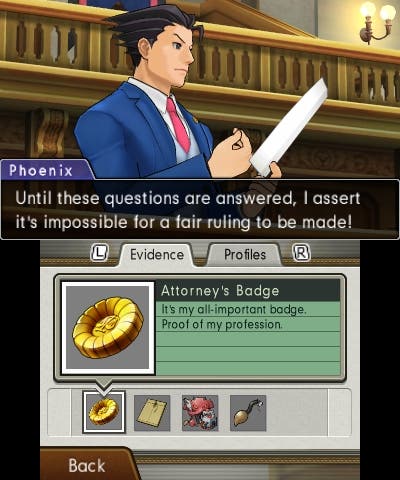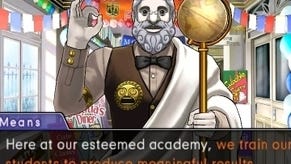Phoenix Wright: Ace Attorney - Dual Destinies review
Hold it.
The Wright Anything legal agency is suitably named in more ways than one. Not only does it offer a lop-sided grin of a pun on its founder and star attorney Phoenix Wright's name, it also bears testament to his legacy. Wright, together with his colleague Apollo Justice (a junior defense lawyer who, in this latest story, graduated to the profession a year ago) has won scores of cases, usually against devastating odds.
But the mark of their work isn't simple success. It is, more often than not, complex success: the sort that wheedles out the essential truth in a situation, rather than the mere verdict that was hoped for. Phoenix is in the business of justice, which is a little different to the business of mere conquest - it's usually harder won and comes at greater cost. In this, the seventh game in a series that has markedly dipped in worth in recent years, the Wright Anything agency earns its name for a third time by righting that downward trajectory in quality. Capcom presents an ingenious and captivating series of cases that thread together into a grand, smartly interlocking narrative - as fine as any previous high point.

Phoenix Wright offers a curious multicultural concoction of influences. The suits, hairstyles and courtroom terminology are all-American, full of Aaron Sorkin-esque "you-can't-handle-the-truth" theatrics, with accusations and bench-slamming counter-accusations flying between the lawyers in front of a usually bewildered witness and judge. The outlandish plotlines are unmistakeably Japanese in their esoteric grandeur. Dual Destines, for example, opens with the case of a schoolgirl accused of blowing up the very courtroom in which much of the series has taken place, before moving on to a murder case involving demon cosplayers in a remote Japanese village.
But the investigative work that you are called to perform has a certain British, Agatha Christie sharpness and whimsy to it, as you somewhat haplessly feel your way through evidence and testimony, feeling for crinkles of untruth or deceit, pursuing certain lines of questioning, never quite knowing whether they will lead to your desired destination. As with most detective fiction, the writers carefully conceal key pieces of information until certain points, so it's never quite possible to solve a case ahead of its conclusion. It's a simple, occasionally cheap trick that remains as effective here as it does in so many Miss Marples.
In Dual Destinies, you play as multiple protagonists: Phoenix, Apollo and the 18-year-old Athena Sykes, a young woman who graduated from law school in Europe (a place so remote and mysterious that young women can apparently train as attorneys while still children) whom the others first meet when she throws a policeman at them. No matter whose shoes you inhabit, the rhythm of the investigation is consistent: you search a crime scene to gather clues and speak to witnesses and suspects before the game moves to the courtroom, where the truth behind the crime fully unravels. The protagonists share a basic toolset in that they are each able to present evidence at set points that proves the validity or falsity of a witness's claims, or reveals contradictions in their testimony.

Sykes has an ability, new to the series, that proves useful in solving many of these cases. Her finely tuned sense of hearing enables her to "hear the words of a witness' heart". This equates to a new style of cross-examination. Sykes can perceive whether a witness is experiencing happiness, anger, sadness or surprise at any given moment while giving testimony. If the experienced emotion conflicts with the words of the testimony (for example, if the witness feels joy when describing the horror of being trapped under masonry and rubble), you're able to press them in an attempt to uncover the inconsistency.
While appearances suggest this is a game about thrusting evidence at trembling liars, it's really about finding the tool of communication that's needed to unlock a person, to make them vulnerable enough to open up
This mechanic (alongside other returning tools of examination in the game, such as Psyche-Lock, in which you must attempt to use words or evidence to literally unlock secrets in a person's heart) helps explain the enduring power of the Phoenix Wright series. No matter how outlandish and ridiculous the scenario, the game is built on the solid foundations of logic and the human psyche. While appearances suggest this is a game about thrusting evidence at trembling liars, it's really about finding the tool of communication that's needed to unlock a person, to make them vulnerable enough to open up. The designers are, at a fundamental level, attempting to turn real-world human tools of communication and negotiation into game systems - and through careful observation and human awareness, they have succeeded with style.

Dual Destinies' presentation is in exact line with previous series entries: a character's internal monologue appears in blue text, while the appearance of a key clue is heralded by a subtle yet important 'ting' sound effect. The 3DS system's 3D effect is used to add life and depth to scenes. The top screen scenes are usually rendered in stereoscopic 3D and often include looping animated touches, such as lanterns swaying in the mountain breeze, of flocks of passing birds. Finally, there are many more pans and crash zooms in the courtroom, which add to the drama considerably, while crime scenes can be explored in 3D.
Nevertheless, this is closer to a novel than an orthodox video game and, while the visual flourishes are welcome, the game's success hinges primarily on the quality of the writing. There is a huge amount of text in the game, but the humour and clarity of the characters' voices encourages thorough reading. And of course, you never quite know when a crucial clue will appear in the dialogue, a keen incentive to pay attention. During the first case these clues routinely appear in highlighted text, with an accompanying sound effect to further draw your attention, but as the game progresses, the responsibility for paying attention passes to you.
Viewed abstractly, Dual Destinies is a straightforward sequence of locked narrative corridors. Your task is simply to find the right clue with which to unlock each subsequent door. There is almost no capacity for player expression: each puzzle has a solitary solution and the only way to excel at the game is to find these as quickly as possible. And yet the smart writing and interlocking narratives elevate the straightforward play, drawing you in with a crime novelist's techniques, then challenging and delighting you with those of a crossword-writer. Few will object to such a potent concoction.
















